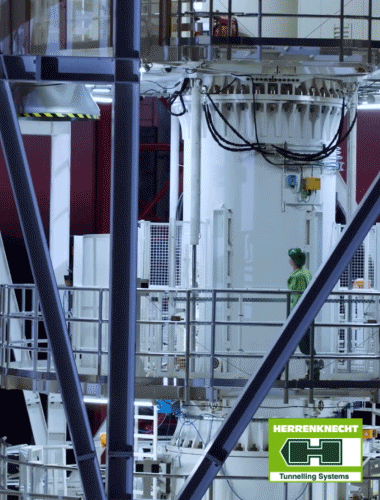Driving forward UK High Speed Rail College 18 Nov 2015
The all-new £20 million UK National College of High Speed Rail (NCHSR) takes a step closer with the appointment of its first Chief Executive Officer.
John Evans will take responsibility, together with his board, for shaping the curriculum, designing the yet-to-be-built college, and liaising with stakeholders – including employers – to help build a new generation of engineers for the delivery of the UK’s £50 billion, 560km, High Speed 2 rail project.
The first fully incorporated college to be developed from scratch, the NCHSR will provide Britain’s workforce with the specialist training and qualifications required to build HS2 and other infrastructure projects in the future.
Evans joins from FirstGroup, where as HR Director he oversaw strategy and delivery. He has also worked for Strathclyde Police, Diageo and British Airways. Evans said: “I am delighted to be joining the college at an exciting and pivotal point in its development. The opportunity to be involved in shaping the college is a huge professional and personal incentive for me.
“I am passionate about the development of young engineering and other talent and I believe it to be critical to building the UK’s future workforce. I am really looking forward to playing a key role in developing the college which will contribute hugely to the delivery of HS2.”
The college will have two main sites, in Birmingham and Doncaster, and will also put in place links with a network of training providers from across the UK. Both cities have recently received formal planning applications for consideration, and construction is expected to begin on the Birmingham site next year.
Sir Albert Bore, Leader of Birmingham Council, said “We’re looking forward to working with John to ensure the National College for High Speed Rail creates a skills legacy for generations to come. In the meantime, the designs for the Birmingham campus have been really well received and we are on track to begin construction in April 2016 before welcoming the first students to Birmingham in September 2017.”
The Chairman of the college board, Terry Morgan – who is also Chairman of London’s Crossrail project – said: “John represents a hugely important addition to the National College for High Speed Rail and I’m extremely pleased to welcome him to the team. His commitment and passion for people development will be vital as we move closer to opening the college in two years’ time.
“The National College for High Speed Rail has a unique opportunity to ensure that the skills needed to support the delivery of HS2 are in place and able to respond to other infrastructure projects in future.”
References
- Underground expansion fuels UK training boom – TunnelTalk, January 2015
High Speed Rail College to plug UK skills gap 5 Oct 2014
A new £20 million further education college to help meet the engineering skills specific to constructing the UK High Speed 2 rail project is to be built in Birmingham.
The UK Government announces that the bid by a consortium of nine educational institutions in the Midlands region has beaten off competition from eight rival bids to build and set up the facility.
The new National College for High Speed Rail will be located on two sites: a main one on Aston Science Park in Birmingham, the city where the first phase of 224km of new rail line will terminate; and another in Doncaster in the north of England. The facility will provide specialist vocational training to the next generation of engineers working on HS2 and beyond. More than 10% of the 560km alignment of Phase 1 and Phase 2 is currently designed to run in twin running tunnels, and with Thames Tideway in construction procurement, and Crossrail 2 on the horizon, the UK is in desperate need of qualified engineers across all disciplines.
The new higher education facility – which will be the first to be built in 20 years – is timed to take its first intake of engineering students in the same year that construction of the £50 billion project is due to start (2017).
As many as 2,000 apprenticeship opportunities are expected to be created by HS2, and there will be around 25,000 people employed during construction. HS2 will support growth in the wider economy and it is predicted that this could lead to an additional 400,000 jobs.
The college will be located in Birmingham’s city centre Science Park and Doncaster’s Lakeside Campus. The governing board will be chaired by Terry Morgan, who is also the Chairman of Crossrail, and will include representatives from Birmingham and Doncaster, alongside HS2 Ltd and leading industry employers.
The nine educational institutions which succeeded in making the Birmingham bid, and which will now be responsible for designing suitable courses, are: University College, Birmingham; South Staffordshire College; Burton and South Derbyshire College; Birmingham Metropolitan College; South and City College, Birmingham; Bourneville College; Solihull College; North East Worcestershire College; and Kidderminster College.
Transport Secretary Patrick McLoughlin said: “HS2 is vital to rebalance the economy and help secure the country’s future prosperity, and construction will start in just three years. We have brilliant engineers in this country, but there are not enough of them. With the creation of a National College we can make sure we give young people the skills they need to build HS2 and other projects right across the country.”
The new college will be led by employers from the engineering and rail sector and will set industry standards for training based on emerging technology and the use of cutting-edge facilities, with trainers who are expert in their field. Work will now begin on building the college sites and developing the courses that will help to train the next generation of engineers and address concerns of potential future skills shortages. In due course, the college will also develop strong links to other institutions around the country.
The hybrid bill that will need to gain approval before construction on Phase 1 between London and Birrmingham can begin is currently before Parliament. Once this is passed a nine-year construction period is due to start in 2017. Phase 2 of construction between Birmingham and Manchester and Birmingham and Leeds (a further 330km), where consultation on the route is still ongoing, is scheduled to be completed in 2033.
The decision to build a dedicated project-specific college mirrors construction of the Tunnelling and Underground Academy (TUCA), which supported the construction of Crossrail in London.
References
- ‘Speed up delivery to cut costs’ says HS2 boss – TunnelTalk, March 2014
- Arguing for the UK high speed rail project – TunnelTalk, March 2014
- Making a business case for UK high speed rail – TunnelTalk, September 2013
- HS2 hybrid bill launched in the UK – TunnelTalk, November 2013
- UK high speed rail needs 56km of twin tunnels – TunnelTalk, January 2013
- Extra tunnels seal UK high speed rail approval – TunnelTalk, January 2012
- UK training academy expands course range – TunnelTalk, August 2012
- UK tunnel safety and training schemes in focus – TunnelTalk, August 2011
- UK MSc course for masters in tunnelling – TunnelTalk, July 2011
|
|
|
|
|
Add your comment
- Thank you for taking the time to share your thoughts and comments. You share in the wider tunnelling community, so please keep your comments smart and civil. Don't attack other readers personally, and keep your language professional.




